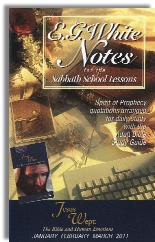|
||||||||||||||
Commentary on "Emotions"
Day 2: Sunday, December 26, 2010 - Negative Emotions
Overview
Today’s lesson focuses on the story of Amnon, son of David, raping Tamar, his half-sister. The lesson emphasizes Amnon’s love and immediate hatred for Tamar after the rape. It further stresses that Tamar did not permit Amnon’s advances which frustrated him; she served Amnon in obedience to David, and she tried to dissuade Amnon from violating her.
The lesson surmises that, after the rape, Tamar “must have felt angry, humiliated, and used; she surely suffered from significantly lowered self-esteem.” The author then notes that Absalom, Tamar’s full brother, advises her to remain silent but plots and eventually kills Amnon to avenge Tamar’s disgrace.
The lesson ends by asking the reader when he has experienced “hatred, sadness, fear, rage, or jealousy,” asks how he dealt with those feelings, and then asks what the person wishes he had done differently.
Observations
Perhaps the most jarring fact of today’s comments is that the story of Amnon, Tamar, Absalom, and David is not primarily about emotions. It is a story about transgression, vengeance, and a weak father.
David must bear a great deal of responsibility for what happened between these three of his children because he, as the father, the leader of his clan, and as the king did not discipline or rebuke his sons—either Amnon nor Absalom. The Law demanded clear consequences for rape; David ignored Amnon’s transgression. When Absalom finally resorted to a greater act of violence—the murder of Amnon—to avenge Tamar’s rape, David mourned when Absalom fled for his own life. He stopped worrying about what to do about Amnon because he was now dead—and he longed for Absalom (2 Sam. 13:37-39).
The problems in this story are not the results of negative emotions or lack of self-control primarily. They are all the results of the spiritual leader not demanding his children and subjects to be obedient to the Law and to God, and they are moreover the result of Amnon and Absalom refusing to honor God by seeking their desires lawfully. Amnon could have asked David for permission to marry Tamar; Tamar even suggested this action—but Amnon refused and forced himself onto her instead. Absalom, feeling responsible because David refused to deal with Amnon, took his own revenge, thus making himself a murderer who had to flee for his life. Absalom refused to appeal to David or to allow God to work out vengeance as He promised to do in the Law (Deut. 32:35).
The players in this story, with the exception of Tamar, were all disobedient to God. None of them acted with faith in His promises or His commands—not even the weak father David. His neglect of disciplining his sons resulted in a legacy of brokenness and resentment.
No amount of “dealing with emotions” would have fixed the deep dysfunction in this family. In spite of David’s chosen status as God’s anointed and the type and forefather of Jesus, he was responsible for the unchecked “bad blood” that tore his family apart. This story is about lack of faith and trust and lack of responsibility.
Unless people submit their desires and feelings to Scripture and to the Lord Jesus, there is absolutely no hope of avoiding such horrific behavior and relationships. No amount of thinking what to do can help us make good decisions if we are not submitting our lives to every word of Scripture.
If Amnon, Absalom, and David had turned to Scripture, they would each have made completely different decisions because their temptations are all addressed in God’s word. In fact, these three men were self-absorbed and desired to fulfill their own fantasies. They allowed their “flesh” to determine their choices instead of submitting those fantasies to God’s word and allowing Him to shape their decisions.
Negative emotions have no hope of being resolved apart from our surrendering them to the Lord Jesus and submitting our minds and hearts to His word. The focus is our relationship to God’s word, not to our emotions.
When we live in submission and surrender, only then can we avoid being controlled by our emotions.
Copyright 2010 BibleStudiesForAdventists.com. All rights reserved. Revised December 27, 2010. This website is published by Life Assurance Ministries, Glendale, Arizona, USA, the publisher of Proclamation! Magazine. Contact email: BibleStudiesForAdventists@gmail.com.
The Sabbath School Bible Study Guide and the corresponding E.G. White Notes are published by Pacific Press Publishing Association, which is owned and operated by the Seventh-day Adventist church. The current quarter's editions are pictured above.
Official Adventist Resources
Standard Edition Study Guide Week 1
Teacher's Edition Study Guide Week 1
Easy Reading Edition Study Guide Wk 1
Search the Complete Published Ellen G. White Writings


